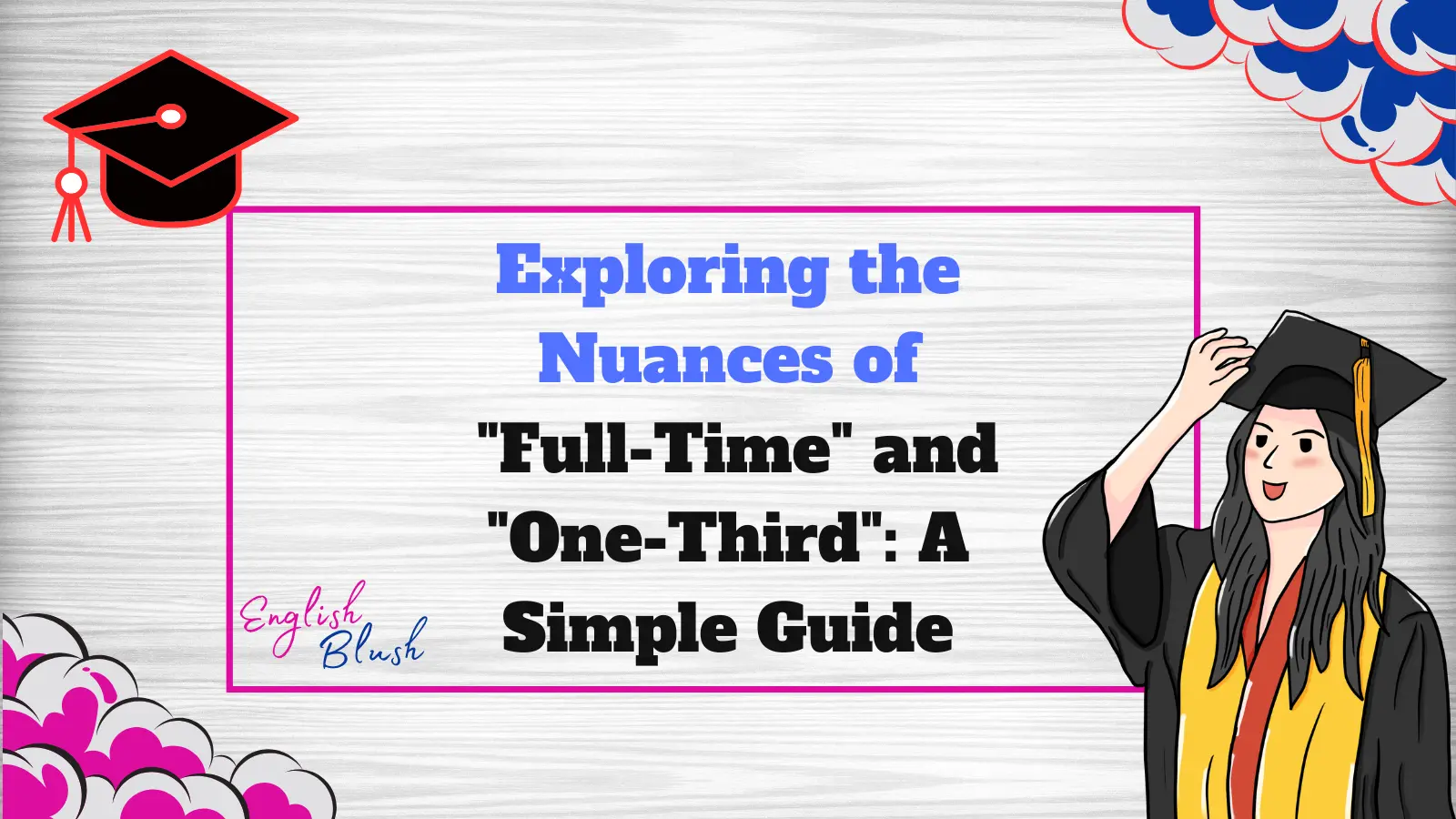Language can be tricky, especially when it comes to understanding the correct spelling and usage of certain terms. Words like fulltime, full-time, or full time and one-third or one third can confuse even experienced writers. This article will examine how these words are used as nouns, adjectives, or verbs, highlight common errors, and explain why grammar consistency matters. We’ll also touch on the differences (or lack thereof) between UK and US English when dealing with these forms.
Part 1: Understanding “Full-Time”
The word “full-time” is commonly used as both an adjective and an adverb. The spelling and punctuation determine whether it is correct and properly communicates its intended meaning. Here’s a simple breakdown:
1. Full-Time as an Adjective
When “full-time” describes something or someone (a job, employee, role), it is a hyphenated adjective.
- Correct Usage:
- Sarah has a full-time job at the hospital.
- Being a full-time parent is challenging but rewarding.
- Incorrect Usage:
- Sarah has a full time job at the hospital.
- He wanted to work fulltime, but his schedule didn’t allow it.
Notice the hyphen (full-time) must be present when it acts as an adjective.
2. Full-Time as an Adverb
When “full-time” describes how something is done, it functions as an adverb and must also be hyphenated.
- Correct Usage:
- She studies full-time at the university.
- He works full-time to support his family.
- Incorrect Usage:
- She studies full time at the university.
- He works fulltime to make ends meet.
Here too, consistency is key—the hyphen makes the sentence clearer.
3. Full-Time as a Noun
Though less common, “full-time” can also be used as a noun, typically in informal contexts. This usage refers to the state of being employed full-time.
- Correct Usage:
- My new job is a full-time, and it starts next month.
- He’s considering taking a full-time instead of freelancing.
- Incorrect Usage:
- I got hired for a full time, and I’m excited!
- She said her current role is just fulltime work.
Once again, the hyphen is necessary to avoid confusion.
4. Fulltime (One Word)
This version (fulltime, no hyphen) is always incorrect in standard English, regardless of the part of speech. Avoid using it entirely, whether as a noun, adjective, or adverb.
Part 2: Understanding “One-Third”
Similarly, “one-third” can be a noun or an adjective, and its correct use depends on context. Paying attention to hyphenation is crucial here as well.
1. One-Third as a Noun
When referring to a fraction or a portion of something, “one-third” acts as a hyphenated noun.
- Correct Usage:
- One-third of the cake is missing.
- I’ll take one-third of the total prize money.
- Incorrect Usage:
- One third of the cake is missing.
- I’ll take one third of the winnings.
The hyphen shows that “one-third” is a compound noun and improves clarity.
2. One-Third as an Adjective
When describing a noun, “one-third” becomes a hyphenated adjective and must always have the hyphen.
- Correct Usage:
- She donated a one-third share of her income.
- A one-third chance of winning is better than nothing.
- Incorrect Usage:
- She gave a one third share to the charity.
- The project is only a one third complete.
3. One Third as a Phrase (Incorrect)
The unhyphenated form (one third) is considered incorrect when referring to the fraction in professional or formal writing. Consistent use of hyphens in such phrases is key for clarity and grammatical accuracy.
4. The Fraction as a Verb Phrase (Uncommon)
Though rarely, the concept of “one third” can be implied in some contexts as a verb or verbal phrase. For example:
- To one-third something (meaning to divide it by three).
This structure is grammatically rare but still requires clear explanation or alternative rephrasing for better understanding.
Part 3: UK vs. US English Consistency
The good news is there is no major difference between UK and US English regarding the use of “full-time” or “one-third.” Both forms rely on the hyphen in their standard spellings. Proper punctuation conventions are universally important, especially in professional and academic contexts.
Why Grammar and Consistency Matter
Using words like “full-time” and “one-third” correctly does more than follow the rules; it ensures your writing is clear and professional. Here’s why:
- Clarity: Proper hyphenation helps readers quickly understand whether a term acts as an adjective, noun, or adverb.
- Professionalism: Small errors in grammar can lead readers to question the writer’s credibility.
- Consistency: Following standard usage reduces confusion, especially when these terms appear repeatedly in a text.
Key Takeaway
- Always use “full-time” with a hyphen for adjectives and adverbs. Avoid “fulltime” entirely.
- “One-third” should also always be hyphenated, whether as a noun or an adjective. Never use “one third” in formal writing.
- Grammar rules are consistent between UK and US English for these terms.
- Paying attention to detail in language enhances clarity and professionalism.





